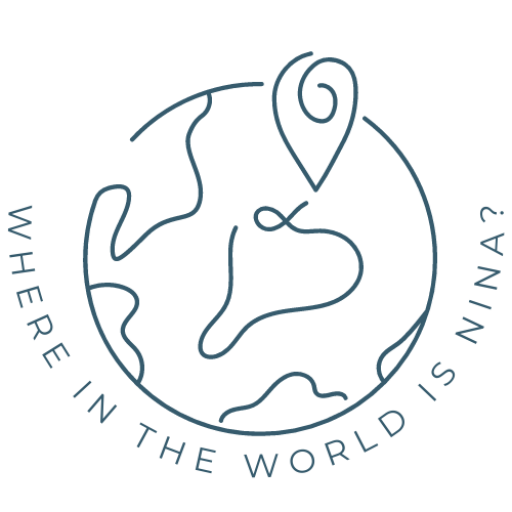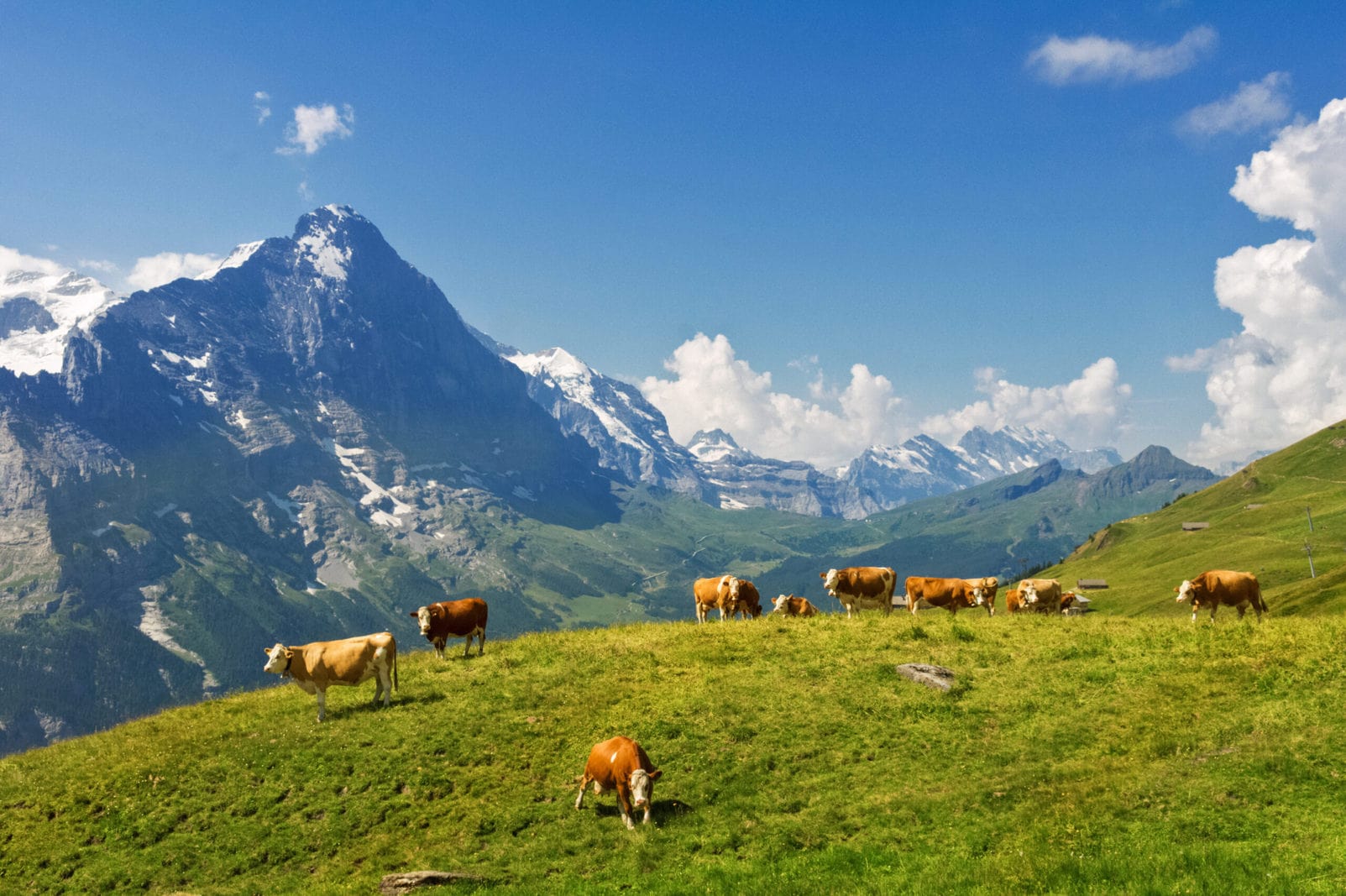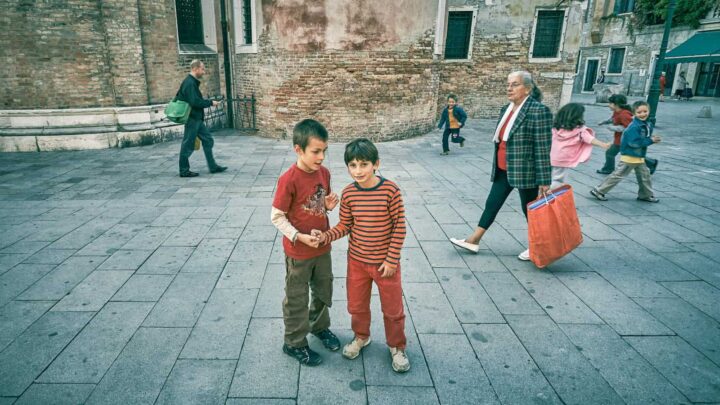What You Can Expect With WWOOFing Around The World
This guide to WWOOFing is authored by LeAnna.
“I’m going to move to a farm in Switzerland to learn how to make cheese,” I told my mom over the phone one afternoon.
“Learn to make what???” She said, only half surprised because this is ME we are talking about. I’ve had this weird, affinitive love for all things cheese for as long as I can remember and I’m always looking for new travel adventures. So combining the two wasn’t the strangest remarks that could have come from me.
“And just how are you going to do that?” Mom humored me.
“I’m going to WWOOF,” I replied nonchalantly.
This is where things finally needed some explanation.
Table of Contents
- What Is WWOOF
- What ISN’T WWOOFing
- What Can You Expect To Get Out of a WWOOF Exchange?
- WWOOFing In Switzerland; Land of Delicious Cheeses
- How Long Do You Have To Agree to WWOOF?
- What Does It Cost YOU To WWOOF?
- Applying To Become a WWOOF Volunteer
- How To Set Yourself Up For the Best WWOOFing Experience Possible
- Contacting Hosts For WWOOF
- Finishing Your Time on the Farm
- More Jobs Abroad
What Is WWOOF
WWOOF stands for World Wide Opportunities on Organic Farms. The idea behind the concept is that local, organic farmers invite travelers to their farms. While on-site, the visitors are expected to “work,” which could be a myriad of duties and responsibilities (but more on that below) in exchange (usually) for room and board.
At the end of the experience, the hope is that you have learned a bit more about ecological farming, sustainable practices, and that you’ve been instilled with a more global view of the world and its farming trades.
RELATED: How To Complete Farm Work in Australia and Extend Your Visa.
What ISN’T WWOOFing
WWOOFing isn’t an excuse for you to just get free travel. Sure, you often get free room and board (not always, again, more on this in a bit) and yes, you can have short days and weekends off, but this isn’t just some free ride so that you can travel. You are expected to fulfill your agreed-upon duties. This is to be considered a JOB.
In line with the above, WWOOFing isn’t for those who don’t believe in organic, sustainable farming. Again, you are doing this more for a cause, rather than the free travel experience.
What Can You Expect To Get Out of a WWOOF Exchange?
Local Life: This will all vary depending on what kind of WWOOF experience you choose. However, it is a phenomenal way for travelers who want to really see the local way of life. After all, you are working and living alongside locals every single day of your exchange!
Unfortunately for me, I wanted to improve my German (I do live in Regensburg, Germany after all) but realized that Swiss Deutsch was a whole different beast than Hoch Deutsch or even the Bayerisch that I was used to using in Bavaria!
Learn about Ecological Farming: It’s also a phenomenal way to learn more about organic farming practices, and even sustainable tourism.
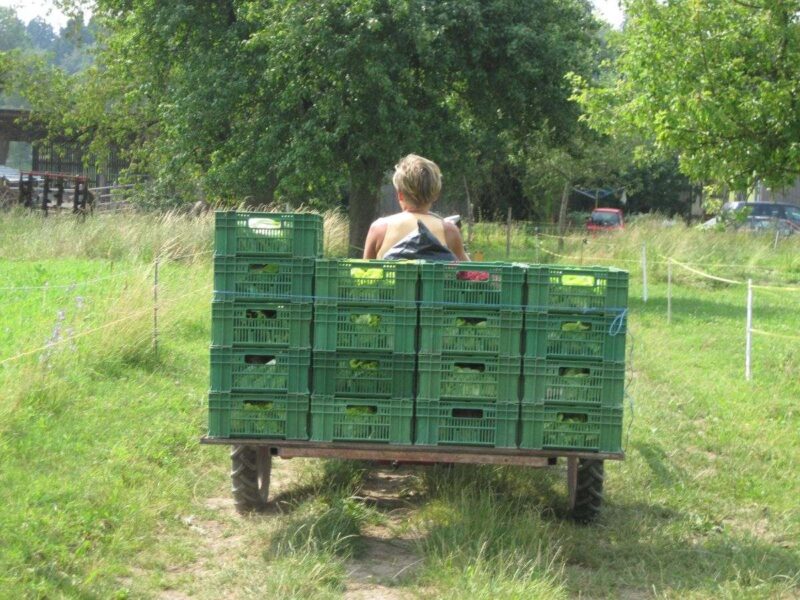
Get Off the Beaten Path: On one of my weekends “off” I actually decided to find ANOTHER farm that was hidden way up in the Alps in a place that would never be found in a tourist guide book. But here, at this small, family-run farm, where they spoke no English, they practiced a traditional form of Alpine Cheesemaking.
They were not in the WWOOF organization, so I was connected to them through my hosts. I arrived in a town with maybe ten other homes and I ended up having to sleep in a tent out with the cows at night because they didn’t have any extra rooms.
Talk about off the beaten path!!! How many people’s alarm clocks are the clanging of cowbells at dawn!?
WWOOFing In Switzerland; Land of Delicious Cheeses
The first time I had heard of WWOOFing, I was in some hostel somewhere in Europe. We were talking to some guys who told us about harvesting coffee beans in Ecuador and another person mentioned helping set up windmill farms in Chile. It was fascinating to hear that “Organic Farms” isn’t just growing broccoli and kale. This got my mind racing.
As mentioned earlier, I love cheese. Yes, Cheese.
Stinky Cheese? Cool.
Blue Cheese? Ah, that’s my favorite color!
Goat Cheese? Yes Please!
SURELY I could find a farm where I could learn to make cheese!!! And what’s a more classic, iconic place than where they make the famous Swiss Cheese!?
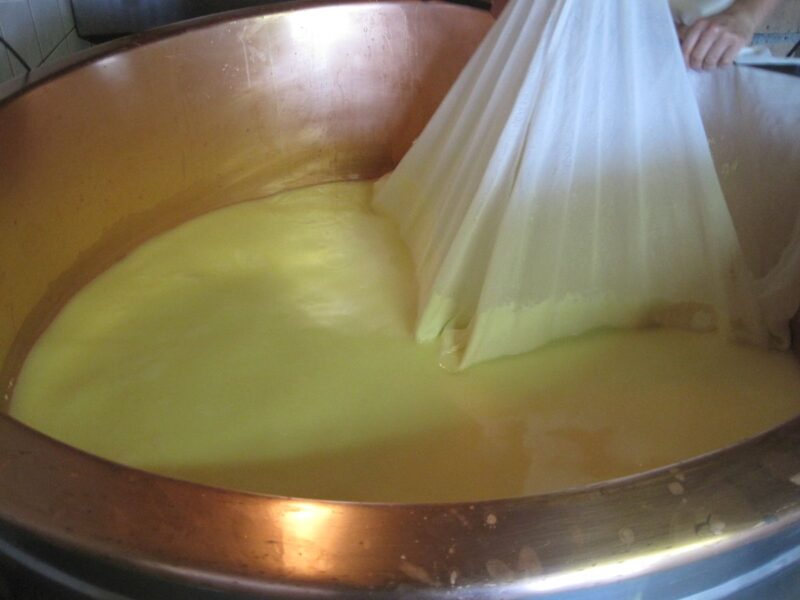
And so, after a few months of researching and contacting local farms, I packed my backpack, got my train ticket to a small village near Bern, Switzerland, and headed out for the adventure of a lifetime.
And since I was already living in and traveling in Germany, we decided to make a long Germany, Austria, and Switzerland trip to tack onto the beginning and end of my farm stay.
RELATED: How To Work Abroad & Travel the World.
Unlock FREE Flights and Hotels!
Credit cards aren’t just for spending—they’re your ticket to epic travel rewards!
By using the right card for your everyday purchases, you could earn points for free flights, hotel stays, and more. No tricks, just smarter travel. Ready to see how?
Daily Expectations WWOOFing
My daily routine was pretty much sorted out before arriving, so I “knew what to expect” in terms of what my day would look like (not that I had any idea of what to expect on HOW I was going to make cheese!)
For me, I would:
- Wake up before the sun had a chance to rise and go help the cow handler move the cows from the barn into the milking room. This mostly consisted of me watching helplessly. I mean, cows are actually HUGE!
- Eat breakfast with the rest of the hired help (about ten farmers from Switzerland). Luckily, we got to reap the rewards of our hard work. Fresh veggies every day, raw milk straight from the cow, steaks right from the backyard, and more. Talk about delicious and healthy food, and yes, all organic!
- Take the milk that was fresh from that morning and assist the onsite cheese maker in making whatever cheeses they needed for the day. We made a local style of Swiss Cheese, some delicious Haloumi, yogurts and sour creams, and even some herbed hard cheeses. Every day was a different style.
- Go work on the agricultural farm doing miscellaneous tasks such as weed pulling by hand (yup, got to love Organic farming!), digging up potatoes, or bundling other veggies to be sold at the weekly markets.
- Eat lunch with the crew.
- Go “Wash The Cheese.” Yes. You read that correctly, I would go down into a cellar and WASH the cheese!
- Have the rest of the afternoon, evenings, and weekends off to do as I pleased.
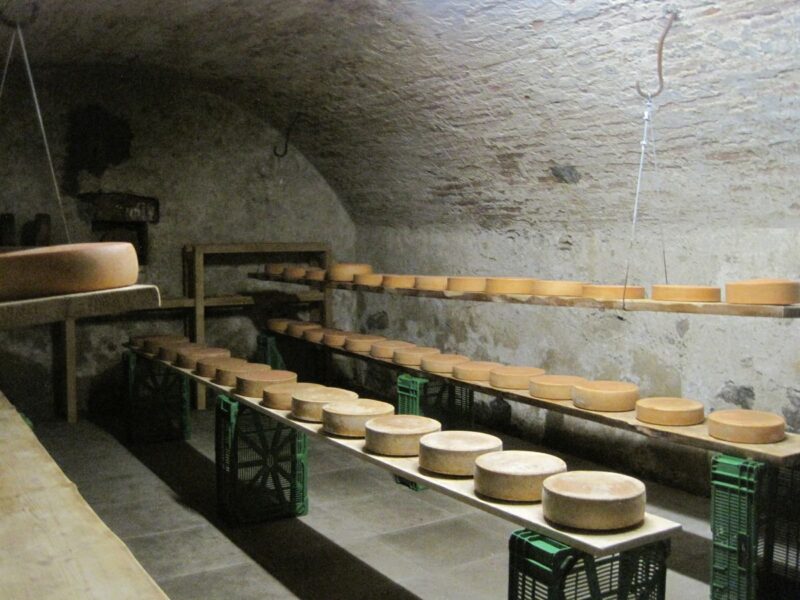
However, depending on the farm you are at, what agreements have been made ahead of time, and other factors, your day could look completely different. For example, the person who did the windfarms in Chile said they worked all day and were exhausted by the end of their shifts, but they also knew that going into their “job.”
You can expect to have to work 4-6 hours a day in general though, which is to be set up before you agree to work with a particular host.
Other Tasks I’ve Heard of With WWOOFings:
- Orchard picking (picking the fruit daily during harvesting season)
- Renovating outbuildings on a farm
- Helping to care for the animals or even pets on the farm
- Weeding farm beds
- Cleaning
- Bee farming
- Fishing
- Clearing branches and trees
- So much more!
How Long Do You Have To Agree to WWOOF?
This will also vary. I found that many farmers had a minimum requirement, typically of at least a few weeks. After all, depending on exactly what you are going to be doing, it can take time and effort to have someone “train” you to do your job as well as set up your room and lodging. Therefore, the farmers need to make it worth their time as well.
On the other hand, you actually can find some WWOOF stays as short as just a few days or even over the weekend! It will take a bit more sifting and your options may be somewhat more limited but it is a possibility.
These often go pretty quickly though, so if you want a shorter stay, you will need to plan well ahead of time and coordinate with hosts.
What Does It Cost YOU To WWOOF?
- In order to gain access to the WWOOF database of hosts, you’ll have to get a “membership” which costs about $40 per country and is good for one year.
- Your own flights.
- Your own transportation to the farm itself (bus, train, etc).
- Travel and activities not at your farm (IE: Weekend excursions, any extra travel, etc).
- Travel and Health Insurance.
- Visas if the country you are visiting requires one.
- Ask your hosts if you are responsible for any meals (I had to make dinner for myself, but breakfast and lunch were provided).
- Phone Services/ SIM Cards (ask if they have internet on-site).
Applying To Become a WWOOF Volunteer
If you haven’t gathered by now, becoming a WWOOFer is actually pretty easy
- Decide which country you want to work in (http://wwoof.net/#destination), click it, and register.
- Pay your membership fee.
- Login to the Membership Area and search for farms that you can stay at.
- Start contacting hosts directly.
- Secure an agreement with a host.
- Travel to the destination!
RELATED: How To Work Abroad Without Experience So You Can Travel Longer.
How To Set Yourself Up For the Best WWOOFing Experience Possible
In order to have the best experience with WWOOFing, you really should spend a lot of time getting things organized, communicating with the farmers, and setting up expectations ahead of time. Don’t rush this process.
Know WHERE You Want To Go
Unfortunately, you don’t just get a database of all the farms in the world connected to WWOOF and then get to filter and sort through them. Therefore, you will need to know the exact country that you will want to be doing the exchange in. You can see where there are currently WWOOF farms here.
- Some people use WWOOF for the entirety of a trip. If you go to a place like New Zealand or Australia, there are so many options that you could spend a week at one farm, hop to another farm for the next week, and so on. Talk about a wonderful way to learn about local life and different farming practices while traveling!
- Other people use WWOOF to determine where they want to go! They might find a really enticing WWOOF placement and say, “Welp, guess I am going to Bolivia!”
- While some already have a destination in mind. Like me. I knew I already wanted to go to Switzerland for cheese, so I had it narrowed down already. Also, since I was going to be road-tripping down to the farm anyway (I currently live in Germany) the hubby and I decided to make a long Germany, Austria, and Switzerland Trip to tack onto the beginning and end of my farm stay.
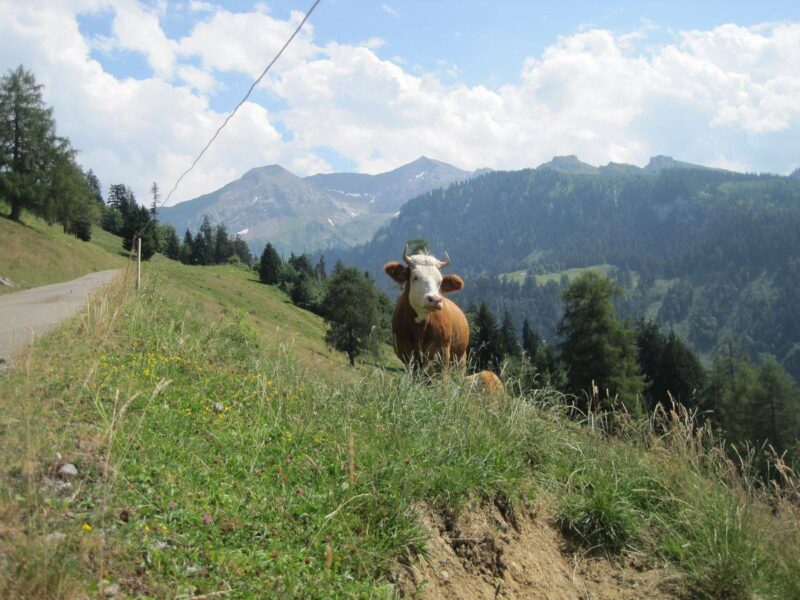
Once you know what country you want to go to, you’ll sign up with that particular location on the WWOOF website. Things have changed over the years, but I was sent a paper book with all of that year’s current listings of hosts.
Luckily, it’s all done online now, and there are even reviews for hosts, pictures to look through, and more to help you discern if it is a farm you want to WWOOF at.
Another thing to consider is the logistical side of things. For example, do you need a visa to enter that particular country? How long are you allowed to stay there? Make sure you know these answers before signing up to a specific location.
RELATED: 17+ Seasonal and Temp Jobs That Could Get You Abroad Faster.
Know What YOU Want To Do Daily
There are SO many different kinds of farms! Are you looking for a particular task or skill to learn or are you just wanting a general experience?
Knowing exactly what kind of farm you would want to work on, will help you narrow down your options when the time comes.
Just remember, even if you want to work on a farm stomping grapes in Italy, this isn’t some Tuscany, laid back, wine-drinking vacay. You are there to work.
What Do You Want To Do Everyday?
While on my farm, there was another fellow WWOOFer and she mostly was just out in the fields every day picking vegetables, pulling weeds, and getting produce ready for market.

This is all fine, but it would have driven me CRAZY! If I wanted to pull weeds, I could have stayed home in my own garden, which ironically, is also always overrun with weeds.
I wanted something unique, something that I couldn’t experience just anywhere.
Contacting Hosts For WWOOF
After you’ve got all the above figured out, you should be able to narrow down actual hosts pretty easily. Start emailing them immediately. Use these tips to increase your chances of getting picked (after all, WWOOF has gotten very popular, so chances are a great farm gets LOTS of requests!)
- Write the email as if you were emailing a potential employer (because, technically, you are!) No jargon and be professional!
- Appease their ego. Why are you choosing THEIR farm over someone else’s? Is there something there that ethically resonates with you, such as a sustainable practice they do? Have you always wanted to learn a very specific skill that they have on-site?
- Give specific dates. Even if you are flexible on your own dates, still give some options. For example, “I am quite flexible on when I could come work with you. Right now I have all of August open if that would work for you.”
- Tell them exactly how long. Again, even if you are flexible on this, tell them you are looking for work between 3-4 weeks long or that “I can only do four days with you, but if there is anything I can do to prepare myself before coming, please let me know.”
- Is there anything specific you want to do? If there is something specific you want to be working on, tell them upfront. For example, had I not specified that I wanted to work on the cheese production, I would have just been picking weeds daily.
- What are the work expectations? It is vital to set and understand these expectations before ever agreeing upon a job. Some people complain of being overworked so in order to avoid this, make sure everyone is on the exact same page before arriving.
In the very first email, ask the following questions:- How many hours a day is expected for work?
- Will you have weekends off to travel locally?
- Is there anything else you need to be aware of or know ahead of time?
- Does anyone at the farm speak English? (And if no, does this bother you?)
- Can They Tell You What To Expect On-Site?
- Are room and board included in the arrangement? If so, what are those specific accommodations (Note: some lodging will be more….ahem, comfortable, than others)
- Will you have your own room or will you be sharing it with someone else (and if yes, what age and sex, if that is something you may need to know)
- Do you have access to fresh, running water?
- Is there a bus stop nearby? Other ways to get around, like a bike you can borrow?
- If you are staying long-term, how close is the nearest grocery store?
The more details you can get sorted out from the get-go, the better for everyone. These are busy, working farmers who don’t have time for a million back-and-forth emails. Get to the point and be upfront with any questions you may have.
After both parties have agreed to all arrangements, make sure you ask for any specific packing suggestions. For example, do you need to bring sunscreen, a hat, special gloves, etc?
Remember, no prior farming experience is required. However, you do have to show up with a good, hard work ethic, be flexible and open-minded, and be ready to learn.
RELATED: The Easiest and Best Travel Jobs That Even You Can Get.
Finishing Your Time on the Farm
After my month of WWOOFing, I did indeed have a different outlook on farmers, their daily lives, and organic living. I was amazed at the dedication, passion, hard work, and logistics, and even bureaucracy that went into having an organic farm.
But I was also able to see how a local Swiss farmer lived day in and day out. I got to break bread with locals and discuss things like current political climates, local holiday traditions, and more. This is something I never would have been able to have done if I had just done the “Highlights of Switzerland” tours that many tourists do.
And while I worked hard during the week, on the weekends, I ventured solo to towns like Geneva, went to the Montreaux Jazz Festival, and went backwoods backpacking into the Alps so that I could hike in the mountains.
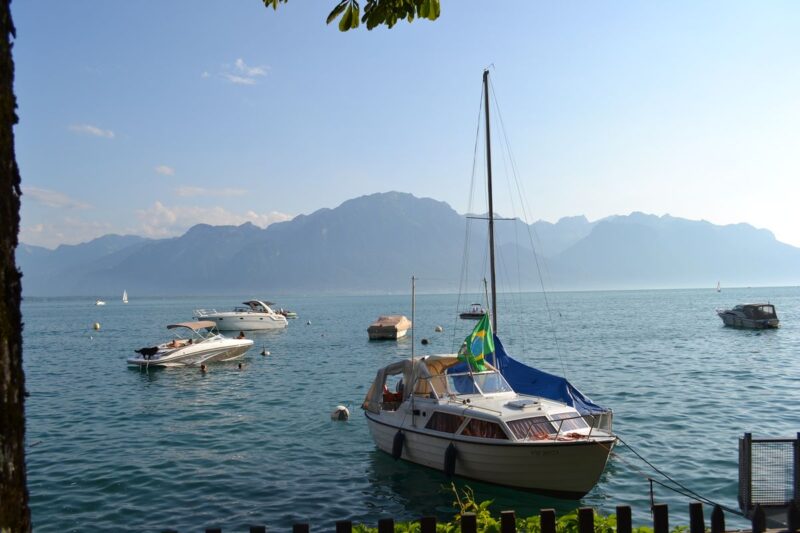
For me, that is what travel is truly about. Travel is about learning new skills that I never would have gotten at home. Travel is about meeting new people. Travel is about really seeing how a local lives their life, day in and day out.
But travel, for me, is about feeling connected to the world at large, despite how small of a role (or job) I may be playing in it.
>>> BIO
LeAnna Brown is a former teacher, current travel addict, and forever Mama. When not traveling the world with her family, she is living her best expat life in Germany. If you can’t find her at a local Christmas Market or Biergarten, then try looking for her at a German Spa/Sauna taking a “Mom’s Day.”
You can get fabulous German itineraries, German travel tips, and anything else Germany travel-related at her blog, Wander in Germany.
